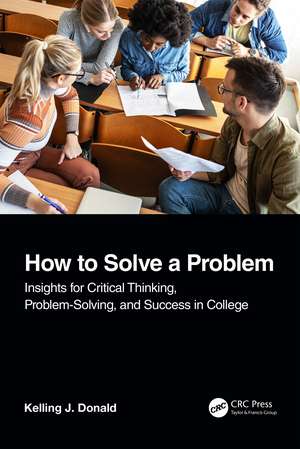How to Solve A Problem: Insights for Critical Thinking, Problem-Solving, and Success in College
Autor Kelling J. Donalden Limba Engleză Paperback – 25 apr 2023
- Offers transferable problem-solving ideas and skills applicable for other disciplines and future careers
- Provides new students with support and inspiration for their college experience
- Includes guidance for successful interactions with professors, peers, professionals, and others
- Encourages thoughtful determination of desired outcomes from the college experience and shaping one's actions toward accomplishing those objectives
| Toate formatele și edițiile | Preț | Express |
|---|---|---|
| Paperback (1) | 228.72 lei 6-8 săpt. | |
| CRC Press – 25 apr 2023 | 228.72 lei 6-8 săpt. | |
| Hardback (1) | 351.97 lei 6-8 săpt. | |
| CRC Press – 25 apr 2023 | 351.97 lei 6-8 săpt. |
Preț: 228.72 lei
Nou
Puncte Express: 343
Preț estimativ în valută:
43.77€ • 47.73$ • 36.90£
43.77€ • 47.73$ • 36.90£
Carte tipărită la comandă
Livrare economică 24 aprilie-08 mai
Preluare comenzi: 021 569.72.76
Specificații
ISBN-13: 9781032203614
ISBN-10: 1032203617
Pagini: 152
Ilustrații: 14 Line drawings, black and white; 6 Halftones, color; 6 Illustrations, color; 14 Illustrations, black and white
Dimensiuni: 156 x 234 x 14 mm
Greutate: 0.23 kg
Ediția:1
Editura: CRC Press
Colecția CRC Press
ISBN-10: 1032203617
Pagini: 152
Ilustrații: 14 Line drawings, black and white; 6 Halftones, color; 6 Illustrations, color; 14 Illustrations, black and white
Dimensiuni: 156 x 234 x 14 mm
Greutate: 0.23 kg
Ediția:1
Editura: CRC Press
Colecția CRC Press
Cuprins
1. On Encountering a Problem. 2. The Logic of the Problem: Good Thinking and its Rewards. 3. Solutions in words: Answering Short Answer Question. 4. Making Textbooks Pay 5. Solutions in Numbers: Basic Mathematical Procedures. 6. Practical Solutions: Science in the Laboratory. 7. Spreading the Word. 8. Persisting Against Problems.
Notă biografică
Kelling J. Donald is a professor of Chemistry, and currently Clarence E. Denoon Jr. Chair in the Natural Sciences, and an Associate Dean in the School of Arts and Science at the University of Richmond (UR). A theoretical chemist by training, he teaches students across the undergraduate Chemistry curriculum, in Introductory and Physical Chemistry courses, and mentors undergraduates in research, employing theoretical and computational approaches to solve chemical problems. Among other acknowledgments of his work with undergraduates, he has received the Distinguished Educator award from UR and the Henry Dreyfus Teacher-Scholar Award from the Camille and Henry Dreyfus Foundation. Born in Jamaica, he lives in Richmond, Virginia.
Recenzii
Donald provides a treasure trove of information applicable to students across the academic spectrum. For example, he presents the rationale for using logic, not rote memorization to solve problems, and he discusses the importance of getting the most from a textbook. Students will find the information in this book invaluable!
Professor Saundra McGuire, author of Teach Yourself How to Learn
Quantitative problem-solving skills are essential for success in introductory science courses. Prof. Donald’s text offers a helpful guide for first year undergraduate students on the necessary basic mathematics and general strategies, as well as explaining how students can more effectively study and communicate their scientific results.
Professor Joshua Schrier, Fordham University, New York
Professor Saundra McGuire, author of Teach Yourself How to Learn
Quantitative problem-solving skills are essential for success in introductory science courses. Prof. Donald’s text offers a helpful guide for first year undergraduate students on the necessary basic mathematics and general strategies, as well as explaining how students can more effectively study and communicate their scientific results.
Professor Joshua Schrier, Fordham University, New York
Descriere
This concise and accessible resource offers new college students, especially those in science degree programs, guidance on engaging successfully with the classroom experience and skillfully tackling technical or scientific questions
